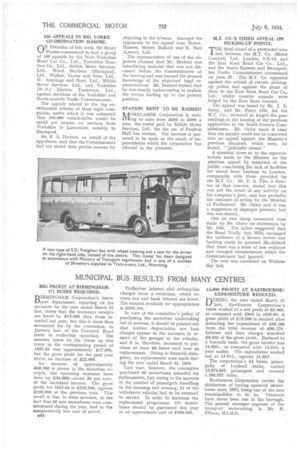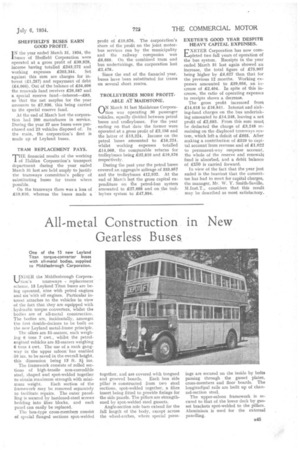MUNICIPAL BUS RESULTS FROM MANY CENTRES
Page 62

Page 63

If you've noticed an error in this article please click here to report it so we can fix it.
BIG PROFIT AT BIRMINGHAM: 171 BUSES REQUIRED.
BIRMINGHAM Corporation's trans.1.-/port department, reporting on the accounts for the year ended March 81 last, states that the tramways receipts are lower by 218,000 than those recorded last year, but this is more than accounted for by the conversion, in January last, of the Coventry Road route to trolleybus operation. The amount taken on the trams on this route in the corresponding period of 1932-33 was approximately 217,000, but the gross profit for the past year shows an increase of 222,000.
An increase of approximately 468,000 is shown in the motorbus receipts, but operating expenses have risen by 434,000—about 50 per cent. of the increased income. The gross profit for 1933-34 is 2233,000, against 2199,000 in the previous year. This result is due, in some measure, to the fact that 65 new motorbuses were commissioned during the year, and to the comparatively low cost of petrol.
a44 Trolleybus interest and redemption charges show a reduction, whilst income tax and bank interest are lower. The amount available for appropriation is 4293,104.
In view of the committee's policy of purchasing the motorbus undertaking out of revenue, it should be pointed out that neither depreciation nor loan charges appear in the accounts in respect of the garages or the vehicles, and it is, therefore, necessary to purchase at least 60 buses each year as replacements. Owing to financial stringency, no replacements were made during the year ended March 31, 1933.
Last year, however, the committee purchased 60 motorbuses intended for replacements, but, owing to the increase in the number of passengers travelling in the morning and evening, 51 of the withdrawn vehicles had to be returned to service. In order to maintain the replacement programme, 171 motorbuses should be purchased this year at an approximate cost of 2300,000. 15,000 PROFIT AT EASTBOURNE: EXPENDITURE REDUCED.
DURING the year ended March 31 last, Eastbourne Corporation's buses worked at a net profit of 25,060, as compared with 2949 in 1932-33. A gross profit of 233990 is reached after deducting the expenditure of 266,186 from the total revenue of 280,176. Interest and loan charges absorbed 48,931 of the gross profit. Reduced to a bus-mile basis, the gross income was 14.59d., as compared with 14.24d. a year earlier. The expenditure worked out at 13.61d., against 14.05d.
The corporation's 54 buses, principally of Leyland make, carried 13,674,855 passengers and covered 1,280,927 miles.
Eastbourne Corporation carries the distinction of having operated motorbuses since 1903, being one of the first municipalities to do so. Tramcars have never been run in the borough. The general manager engineer of the transport undertaking is Mr. P. Ellison, M.I.M.E. SHEFFIELD'S BUSES EARN GOOD PROFIT.
I N the year ended March 31, 1934, the
buses of Sheffield Corporation were operated at a gross profit of £39,928, income having totalled £243,272 and working expenses £203,344. Set against this sum are charges for interest (£1,257) and repayment of debt (£4,066). Out of the balance of £34,606 the renewals fund receives 226,587 and a special reserve funds—interest—£83, so -that the net surplus for the year amounts to £7,936, this being carried to the special reserve fund.
At the end of March last the corporation had 200 motorbuses in service. During the year 37 new buses were purchased and 23 vehicles disposed of. In the main, the corporation's fleet is made up of Leyland buses.
TRAM REPLACEMENT PAYS.
THE financial results of the working of Halifax Corporation's transport department during the year ended March 31 last are held amply to justify the tramways committee's policy of substituting buses for trams where possible.
On the tramways there was a loss of £19,810, whereas the buses made a profit of £10,676. The corporation's share of the profit on the joint motorbus services run by the municipality and the railway companies was £6,656. On the combined tram and bus undertakings, the corporation lost £2,478..
, Since the end of the financial year, buses have been substituted for trams on several short routes.
TROLLEYBUSES MORE PROFITABLE At -MAIDSTONE.
(IN March 31 last Maidstone Corpora
tion was operating 30 passenger vehicles, equally divided between petrol buses and trolleybuses. For the year ending on that date the former were operated at a gross profit of £2,156 and the latter of £13,224. Income on the petrol buses amounted to £16,224, whilst working expenses totalled £14,068, the comparable returns for trolleybuses being £32,810 and £19,576 respectively.
During the past year the petrol buses covered an aggregate mileage of 333,957 and the trolleybuses 412,932. At the end of March last the gross capital expenditure on the petrol-bus system amounted to £27,688 and on the trolleybus system to £47,894. EXETER'S GOOD YEAR DESPITE HEAVYCAPITAL EXPENSES.
EXETER Corporation has now completed two full years of operation of the bus system. Receipts in the year ended March 31 last again showed an increase, the total figure of £75,907 being higher by £4,627 than that for the previous 12 months. Working expenses amounted to £59,056, an increase of £2,404. In spite of this increase, the ratio of operating expenses to receipts shows a decrease.
The gross profit increased from £14,618 to £16,841. Interest and sinks ing-fund charges on the bus undertaking amounted to £14,248, leaving a net profit of £2,593. From this sum must be deducted the charge of £3,248 re. maining on the displaced tramways sys, tern, which left a deficit of £655. After making a contribution of £520 to capis tal account 'from revenue and of £1,022 to permanent-way suspense account, the whole of the reserve and renewall fund is absorbed, and a debit balance of 4150 is carried forward.
In view of the fact that the year just ended is the heaviest that the committee has had to meet for capital charges, the manager, Mr. W. Y. Smith-Saville, M.Inst.T., considers that this result may be described as most satisfactory.




































































































